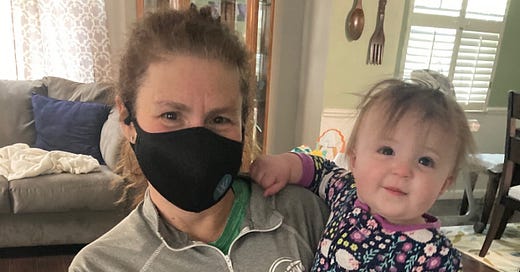Compassion Overcomes Differences in Times of Crisis
Inspiration from the Broadway show Come From Away
Hi, everyone! Our posts are completely free to read. If you enjoy our work and wish to support our book, there's an option to upgrade at the bottom, but there's absolutely no pressure. We are grateful to all of our subscribers!
Not long ago, I went to see the Broadway Tour of Come From Away, which depicts the true story of flights diverted to Gander, Newfoundland on 9/11. There, the townspeople welcomed travelers, providing food and lodging until flights could re-enter US airspace.
I’ve seen the show before, but rewatching it in the months following the November 2024 election surfaced some new emotions and reflections about the times in life we feel most vulnerable and uncertain.
On September 11, 2001, I lived in western NY. I heard the news of the terrorist attacks while visiting my previous workplace, bringing my first child to meet my past colleagues.
My child, only a few months old, slept peacefully while we all gathered around a television to watch the news. I quickly packed up and went home, ending the visit. I felt desperately anxious to hear from my husband, who was on a bike tour with a friend, somewhere in Pennsylvania. This happened before he had a cell phone, so I had no way of reaching him.
I remember the intense disbelief and fear I felt. Home, alone, with my new baby. What would be life be like for this child? Would our lives ever be normal again? How would our nation recover from this brutal terrorist attack?
The beginning of the pandemic, starting March 2020, evoked similar concerns, the same worries and wonderings. How would the COVID virus and the shutdowns affect my children? When would life return to normal?
Visiting a colleague with her new baby in fall 2020.
In addition to concerns about my family, I worried about my business. Would we survive?
It’s not an exaggeration to say that I felt echoes of this same vulnerability and uncertainty on the days following the November 2024 election.
My first child, now a grown adult, is transgender. When Trump took office and began working to dehumanize gay and transgender people, I became deeply concerned about my son’s wellbeing. Not unlike those first days after 9/11, I wonder about how life might become for my child, whether he will ever feel completely safe and included again. Whether his life can be normal in the United States under this administration.
I joined this book and Substack project so I could speak up about the issues I’m most concerned about. While I strongly disagree with what’s happening with our current administration, I do not want to allow political differences to get in the way of my honoring others and acting toward every human with dignity and respect.
Finding common ground with others can be challenging, if not impossible, when people’s beliefs disregard or marginalize my son’s humanity. There are some topics where it’s not possible to agree to disagree, but our disagreement need not lead us to dehumanizing each other.
I’m curious whether tapping into those feelings and experiences we’ve universally experienced, including the pandemic and the 9/11 terrorist attacks, could give us a common ground to get to know, connect with, and build bridges with those who may hold different political perspectives from us.
Most of us can vividly remember the anxiety we experienced during the beginning of the pandemic: the loss of control, the loneliness, the disruption of our comfortable routines, activities, and travel. Many of us also carry deep grief for loved ones we lost to the virus.
Our shared suffering and discomfort is a language to bond us. When we are in a crisis, our compassion meets needs in a way that sets differences aside.
The same impulse we felt after 9/11 to extend kindness toward others, that impulse that propelled the people of Gander to extend themselves on behalf of the diverted travelers, this is the impulse I want to be the guiding force of my interactions with those people with whom I might disagree politically.






Thanks for writing about shared vulnerability and insecurity felt during 9/11, the pandemic, and recent political chaos. I love and agree with this thesis sentence: “When we are in a crisis, our compassion meets needs in a way that sets differences aside.”